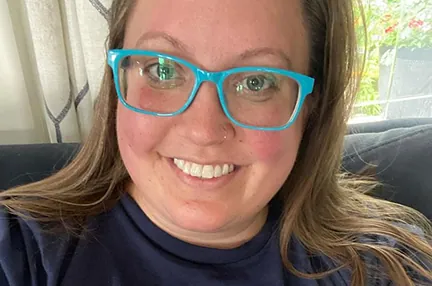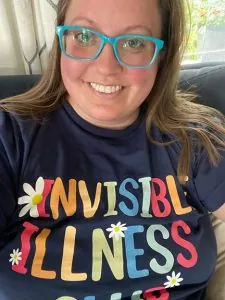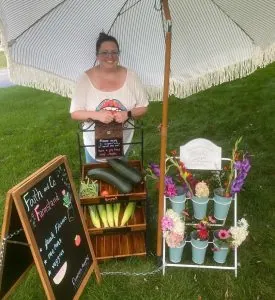Blog
Never-Ending Battle: A Personal Fight for Medical Care

 “Sometimes, I feel like I’m living in an alternate reality, like I’m stuck somewhere on the inside and I’m watching everything else happen outside of me.” When I asked Ruth, who’s living with an alphabet soup of autoimmune diseases, including hypocomplementemic urticarial vasculitis (HUVS), what it’s like living with a chronic illness, her voice softened, cracked. “It feels like a thief,” she said. “It’s my full-time job. The things that we have to fight for, many people who are not in our situation would never understand or know what goes on. It is extremely isolating.”
“Sometimes, I feel like I’m living in an alternate reality, like I’m stuck somewhere on the inside and I’m watching everything else happen outside of me.” When I asked Ruth, who’s living with an alphabet soup of autoimmune diseases, including hypocomplementemic urticarial vasculitis (HUVS), what it’s like living with a chronic illness, her voice softened, cracked. “It feels like a thief,” she said. “It’s my full-time job. The things that we have to fight for, many people who are not in our situation would never understand or know what goes on. It is extremely isolating.”
When I spoke to Ruth on the phone that day, she was kind, forthright, articulate, and wise. “Where do you get your wisdom from?” I teased her. She laughed, “Years of therapy.” But, on days when her brain fog is really bad, she told me she can’t remember all her daily tasks: “I have visuals up in the house that help me remember what to do during the day . . . . It feels like a constant battle.”
 Ruth is an avid gardener, harvesting vegetables and fruits and tending to perennials. She loves animals and loves to read—”I read a little bit of everything. I’m not really into sci-fi,” she said,
Ruth is an avid gardener, harvesting vegetables and fruits and tending to perennials. She loves animals and loves to read—”I read a little bit of everything. I’m not really into sci-fi,” she said,
“but I like a good romance novel.” We both let out a knowing laugh. “I have a lot of books about gardening. I like to read stories of people with chronic health conditions and my Christian devotionals. Everything.”
For ten years, she was a kindergarten teacher, until she had to stop working. “I love working with kids, especially those kids who have gone through a lot of trauma. I can relate to that. It’s similar to how I grew up.”
In fact, it was those kindergarteners that planted a seed in her as her illnesses developed. “In the classroom, we talked about social-emotional learning and self-care. I was trained in a trauma-informed class.” As she got sick, she had a realization: she needed to take what she learned as a teacher and apply those tools to her own life. “I told myself: Practice the mindfulness you do in the classroom with your 5-year-olds. Once I did, I saw a new sense of calm in my life.”
Despite her sense of calm, she says living with a chronic illness is a “never-ending battle.” It is, quite literally, the fight of her life.
A year ago, Ruth landed in the ER. The ER doctor had critical advice: “You need to be on IVIG infusions,” he said. “I work with autoimmune disorders. The infusions would change your life.” This was the second time a doctor had mentioned the infusions.
So, at her next appointment, she brought it up. Her physician was hesitant at first: would it cause clots with her antiphospholipid syndrome (APS) or her lupus? Ruth pushed back: “It has its benefits and its risks, just like everything else I’m on. If it can improve my quality of life, I want to pursue it.” Her doctor agreed. 
Her rheumatologist was the first to submit the request for Ruth’s IVIG infusions for her lupus. Ruth jumped into action, taking on the burden of proving she meets the criteria. “There are so many conditions these infusions help with,” she told me, “that aren’t FDA approved. I provided my rheumatologist’s office all the articles and research for them to submit to my insurance company.” When I asked her about taking on that load, digging through often dense medical studies, she laughed and said, “I’m not a doctor myself, although we joke at this point that I should be.”
They submitted all the paperwork. The request was denied.
Next, her allergist and immunologist put in requests for her MAST cell disorder. Denied.
Another doctor requested IVIG for her vasculitis. Denied.
Another for her autonomic autoimmune neuropathy. Denied.
“It’s just exhausting,” Ruth said. She’s committed to appealing, but knows she’s the one who has to push it through—otherwise, she said, “it would just be dropped.”
Repeatedly, Ruth’s told, “This is just how insurance works.” For Ruth and so many people like her, this is not okay. “The way it is” is not enough.
“It’s always a struggle to get the medical care you need—procedures, medication, referrals. I spend most of my days on the phone with insurance or doctors,” Ruth said. One of Ruth’s doctors has told her that “many of her patients are on IVIG and it’s working miracles for them.” Ruth’s insurance company doesn’t seem to care.
When she’s on the phone with her insurance company, she tries to humanize her struggle. “What if this was your daughter or your son or your mom?” she asks them. “You would want them to get the treatments they need.”
According to the National Institutes of Health (NIH), “the average cost per IVIG infusion in the USA [is] $9,720.” On average, most patients receive “4.3 infusions per month,” which brings the monthly cost to over $41,000. Exorbitant.
Months back, Ruth had a port surgically placed in her just for the IVIG treatments. “The infusion nurses fought like heck to get that port put in.” The port is in, but it’s not being used. And Ruth is left without the treatment she needs.
This is, by far, not Ruth’s first and only battle with her health insurance company. “I’ve had medications I’ve been on for years that are the only things that work,” she said, “and I’ve had them taken away because the insurance company decides to make an exclusion in the plan. It’s constantly changing; it’s constantly a new fight. I have never-ending lists: What do I need to fight for today?”
 In her Instagram bio, Ruth writes that she is a “Chronic Illness Warrior” and she offers her suggested resources: links to the National Alliance on Mental Illness (NAMI), the 988 Crisis Line Chat, and the Milwaukee County Peer Warmline. She also has a quote by Vincent Van Gogh: “Normality is a paved road. It’s comfortable to walk, but no flowers grow on it.”
In her Instagram bio, Ruth writes that she is a “Chronic Illness Warrior” and she offers her suggested resources: links to the National Alliance on Mental Illness (NAMI), the 988 Crisis Line Chat, and the Milwaukee County Peer Warmline. She also has a quote by Vincent Van Gogh: “Normality is a paved road. It’s comfortable to walk, but no flowers grow on it.”
I wanted to know why she chose that quote to define her. “What does it mean to you?” I asked.
“For those of us who are chronically ill,” she said, “it’s not a cookie cutter path. You have to advocate for yourself and you have to do things that other people don’t have to do. It’s like the flower: you won’t have growth if you take the common road.”
Ruth is walking that unpaved path. And she’s not giving up. She wants to continue advocating for herself and the countless “chronic illness warriors” around the country. Speaking to them, she said, “Know you’re not alone. And use your voice no matter how hard it is. If you find yourself with a provider who is not willing to let you use your voice, then switch.”
 She recommends support groups, too: “I’ve met people across the country that I would now call friends. I talk to them daily; we check on each other. Join the groups and reach out when you’re having trouble because there are people out there going through the exact same thing.”
She recommends support groups, too: “I’ve met people across the country that I would now call friends. I talk to them daily; we check on each other. Join the groups and reach out when you’re having trouble because there are people out there going through the exact same thing.”
With support and determination, Ruth is refusing to let her illnesses hijack her life. She has found new hobbies and activities she loves that provide what she calls necessary “distractions.” In the spring, she started a free community farmstand where her neighbors can get flowers, fruits, and veggies that come from her garden. “It gave me back a sense of purpose that had been taken away,” she said. And it cultivated a nourishing community for her: “I would receive canned items in return and lovely notes. I even became friends with one of the local women who frequented my stand. We have coffee every few weeks!”
Ruth is embodying this truth: when we’re living with a chronic disease, we may not get to move on from it, but we can move forward with it. She invites you to join her in this quest. Imagine: What could moving forward look like for you?
Written by Ashley Asti

